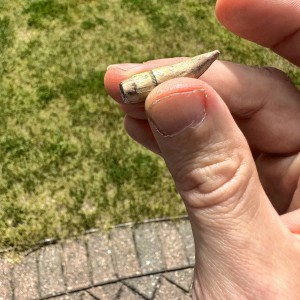Acorn to Arabella: Two friends and the journey of a wooden boat
| Published: 10-31-2018 3:24 PM |
According to Alix Kreder, his college buddy Steve Denette had been working on a certain project for years — but only in his head.
“Years and years,” added Denette as he broke for lunch in the kitchen of his Granby home one weekday last month. “Building a big wooden boat and taking it on an adventure — preferably around the world — has always been one of those little twinges in the back of my brain,” he said. “It’s like, ‘That’d be cool to do, someday…maybe.’” Now with the help of a community that he and Kreder have fostered — online as well as in person — the two are realizing that dream in a project they’ve dubbed Acorn to Arabella.
“Arabella” is a 38-foot, 25,000-pound displacement wooden boat based on designer William Akin’s 1934 plans for the “Ingrid.” “Acorn” refers to the fact that the boat is being built from scratch — with 90 percent of its lumber milled onsite from the family property of Denette, a fifth-generation Granby native.
After meeting at Unity College in Maine, Denette and Kreder, now 33 and 32, respectively, went in completely different directions but stayed in touch. Kreder, originally from France, worked on both sides of the Atlantic, while Denette earned a Master’s degree in education; he also added to his considerable woodworking skills and began accumulating a collection of odd tools he thought he might need one day.
Then during a Cape Cod vacation, around 2010, Denette visited a used bookstore to pass the time on a rainy day and happened upon the book “Fifty Wooden Boat Plans.”
“That really got the gears going,” Denette said. He began to entertain the idea of building a boat. After a few more years of serious research, he felt he had the tools, the knowledge and the “lion’s share” of materials — the trees — that he would need to make it happen.
Kreder was intrigued but concerned about how to pay for it. Then, in 2016, he got a text from Denette: “I’m pretty sure I’ve figured out a way for us to get paid to build the boat.” In his research Denette had seen videos of people sailing around the world and supporting it with a type of subscription-based “crowdfunding” for artists and other creators through a platform called Patreon. Those who are interested in a project — who get enjoyment or education or some benefit from it and want to see it continue — will sign up to give a set amount, say $1 a month, or $10 a month. Denette, “technologically illiterate” by his own admission, suggested Kreder do the videos.
Kreder, though he has a degree in photography from the Maine College of Art, had never edited a video before but agreed to film the boat-building process and produce videos every other week as a way for people to see, appreciate and learn from the project. He left his job at a study abroad organization in Portland, Maine, to move in with Denette and begin learning video.
Article continues after...
Yesterday's Most Read Articles
 Holyoke man finds bear paw in his yard
Holyoke man finds bear paw in his yard
 Developer lands $400K loan for affordable housing project in Easthampton mill district
Developer lands $400K loan for affordable housing project in Easthampton mill district
 Petition to block auto dealership on King Street falters in Northampton
Petition to block auto dealership on King Street falters in Northampton
 Fearful Belchertown residents blame stray bullets on nearby gun club, appeal to town for help
Fearful Belchertown residents blame stray bullets on nearby gun club, appeal to town for help
 South Hadley man fatally shot in attempted robbery
South Hadley man fatally shot in attempted robbery
 First look at how little Amherst’s police alternative being used called troubling
First look at how little Amherst’s police alternative being used called troubling
“When we first started, everything was on our own dime and in our spare time,” says Denette, who was working full-time as head route setter at the Rock Gym in Hadley. Kreder had picked up a job at a local coffee shop and both would work on the “boat build” on nights, weekends, vacations and holidays.
Last winter, after casting a 4 1/2-ton keel of molten lead in their back yard, their YouTube subscriptions surpassed 10,000, and more people discovered Patreon. Soon there was enough monthly revenue to cover their expenses and both quit their jobs to work on Arabella full time. Now those followers are up to 70,000 on YouTube.
Some followers of the Acorn to Arabella project come from far and wide to contribute their time and skills to be part of it. Last month, three such volunteers — Ross Cooper of Washington, D.C., Ryan Maul of Colorado Springs, Colorado, and Bob Pappas of Pensacola, Florida — worked at the site for an entire week leading up to, and including, the critical weekend of “steaming in.”
Over that week, Denette and this “bend crew” trimmed planks of rough-milled white oak into precise 2 ½-inch square framing for the hull. On the day of the steam-in, each of these lengths was placed in a steam box for 80 minutes or so to soften it up. Then, in a carefully orchestrated maneuver watched by a festive crowd on hand, the timbers were pulled from the box, one set at a time, and quickly fitted between the wooden molds on the boat. Before each piece has a chance to cool, it is bent using ratchet straps, brute force and the weight of the crew’s bodies and then clamped into place to create the gentle “S” profile distinctive to each side of the hull. Over the weekend, the crew was able to install 26 of the 74 frames needed.
Work over the last 2 ½ years has been consuming and challenging. “It’s like timber-framing on steroids — everything meets at funky angles,” said Denette. And the video production is the “biggest invisible part of the project,” actually more time-consuming than the boat build itself. Kreder regularly works through four to 10 hours of footage just to gain a 20-minute segment. But video is the best way to share the experience and fund it. The two say they won’t sacrifice quality for the sake of speed.
There’s a lesson here for a world where next-day delivery is becoming the norm, notes Kreder: “In terms of the educational aspect, it’s also a way to show people that things don’t get done overnight.”
Denette adds: “For us it’s about the boat and the journey and the whole process of that and sharing it.”
But seeing the impact they’ve had on people’s lives — all around the world — is something they never anticipated and has turned out to be one of the most rewarding aspects of the project, Denette says. He mentions the story of an Australian soldier who returned home with PTSD, lost everything and ended up in the hospital. During his hours of down time, he came across the Arabella videos and emailed Denette and Kreder to thank them for being a “bright spot in an otherwise dark time.” They sent him a link to a story about a veterans’ sailing program in Europe where everyone on board is dealing with PTSD. The next communication they got was a picture of the soldier sailing and a note saying that it has been helping him tremendously.
There are stressful moments, but the two friends maintain an easygoing attitude about the project. When asked how long it’s going to take to build the boat, their standard answer is “two to 10 years.” When they started the project, neither Denette nor Kreder had even sailed on a sailboat. Kreder said if you look back to the first videos, they’re “terrible.”
“But it’s great because, for both sides of the project (boat building and videotaping), we’ve taught ourselves and you can see the progression of it,” he added.
As for whether it will be all smooth sailing from here, Denette is realistic in his outlook. “There’s a good chance we’ll have a hiccup,” he said.
Kevin Gutting can be reached at kgutting@gazettenet.com
 A Look Back: April 20
A Look Back: April 20 New HCC president reflects on journey: Timmons sees his own struggles and arc in students’ paths
New HCC president reflects on journey: Timmons sees his own struggles and arc in students’ paths Historic murals restored at Victory Theatre in Holyoke
Historic murals restored at Victory Theatre in Holyoke
